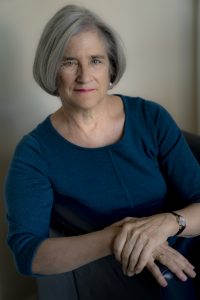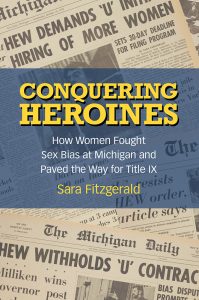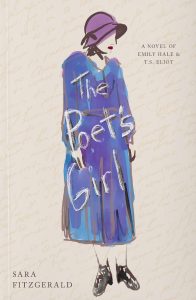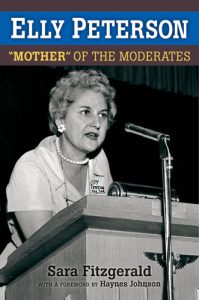Talking About Women’s History: Three Questions and an Answer with Sara Fitzgerald
Sara Fitzgerald is an author and retired journalist who has been researching the untold stories of little-known women since she earned a bachelor’s degree in honors history from the University of Michigan in 1973. Her journalism career included 15 years as an editor and new media developer for The Washington Post. In 2020, the University of Michigan Press published her book Conquering Heroines: How Women Fought Sex Bias at Michigan and Paved the Way for Title IX in connection with the 50th anniversary of the so-called “HEW complaint” and the 150th anniversary of the admission of women to Michigan. Fitzgerald covered the complaint as a staff member of The Michigan Daily, the U-M student newspaper; in 1972, she became the first woman to serve as its editor in chief. In 2013, Fitzgerald contributed a project on the Michigan complaint to Volume 17 of “Women and Social Movements in the United States: 1600-2000.” Fitzgerald is also the author of a biography, Elly Peterson: ‘Mother’ of the Moderates (University of Michigan Press, 2011), which was recognized by the Historical Society of Michigan and as a Notable Book of the Year by the Library of Michigan. She is also the author of the 2020 novel The Poet’s Girl, and now is completing a biography on the subject of that novel, Emily Hale, the longtime secret muse of the poet T. S. Eliot.
Take it away, Sara!
When did you first become interested in women’s history? What sparked that interest?
I attended the University of Michigan between 1969 and 1973. It was a time of great turmoil on campus—and a time of great change for women. It was during those years that Ms. Magazine was created, the National Women’s Political Caucus was founded, the Equal Rights Amendment first cleared Congress, and the Supreme Court affirmed the reproductive rights of women in its Roe v. Wade decision. At the end of my freshman year, a group of women filed a sex discrimination complaint against the university that was ultimately successful in forcing Michigan to change some of its long-standing, discriminatory practices. At that time, it was revealed that admissions officers had imposed a quota of 55 percent men: 45 percent women for my freshman class, because they were concerned about what one described as a potential “over-balance” of women in my class because women had been out-performing men in high school.
I started off as a journalism major, but by my junior year, I decided to make history my main field of study. It was a time when women professors were eager to research and teach topics related to women’s lives, even if they had to hold the courses in their living rooms, as one of my professors was forced to do. Within a few years, these professors established the Women’s Studies Program at Michigan.
I was lucky to get to know Kathryn Kish Sklar, a pioneer in the field of women’s history. (Kitty’s biography of Catherine Beecher was a finalist for the National Book Award for Biography in 1974.) As I pursued my courses in history, I always looked for a fresh topic related to women to research and write my papers about. The summer before my senior year, I read Nancy Milford’s ground-breaking biography of Zelda Fitzgerald and decided to write my senior thesis on the flapper phenomenon. When I retired from a career in journalism and public policy work and looked around for what to do next, I realized how much I had enjoyed researching and writing about the lives of women, and returned to those roots.
Did you have a woman (or group of women) from the past who inspired you as a child?
My parents were moderate Republicans, and in 1964, I was watching television coverage of the Republican National Convention when I was astounded to see network correspondents interviewing a woman named Elly Peterson. I think I took note of her because it was so rare to see a woman on the political stage back then, and I was proud that she came from my home state of Michigan. At that time, she was the highest ranking woman in the national Republican Party, she was running for a Senate seat from Michigan, and she was about to become the first woman to address a national presidential convention in prime time. She did not win her Senate race, but she got on my radar screen. During my college years, she became one of the Republican leaders of the National Women’s Political Caucus after it was founded. Then in 1976, she was recruited, along with Democrat Liz Carpenter, to chair ERAmerica, the coalition of groups that was organized to work for ratification of the Equal Rights Amendment, to try and counter the opposition of Phyllis Schlafly.
As fate would have it, I got to meet Peterson a few years later when she moved to the same retirement community in North Carolina where my parents lived. She was a true “people” person, friendly and outgoing, and later sent me some “fan mail” about a novel I wrote at the time.
When I retired earlier than I had expected, I reflected that she was one of those little-known women of our history who deserved to be better known. She had since moved to Colorado, but I was able to track her down and explore whether she was interested in working with me. In the end, I wrote her biography. She was supportive of the project, but it was not an “authorized” biography, per se. But it was a very satisfying project, and I was only sorry that I was not able to complete the book before she died—two days after Hillary Clinton formally ended her first presidential campaign in 2008.
How does your experience as a journalist inform your work as a biographer?
Biographers need to get inside the heads of their subjects, but I find I have to push myself to go beyond the known facts of a person’s life. I am currently working on a biography of Emily Hale, the longtime secret love of the poet T. S. Eliot. I previously wrote a novel about her, but after their lengthy correspondence was opened in 2020 after a fifty-year embargo, I decided to write a more traditional biography. So I’m now trying to be more careful about what is known about her and what is just speculation—or taken as fact because Eliot wrote it. Most of the scholars who are writing about Hale and Eliot come from the discipline of English literature and are primarily interested in analyzing Hale’s impact on Eliot’s poetry and plays—an approach that is much more subjective, I think, than historical analysis. I’ve also come to realize that because Hale was, by nature, a very private, reticent person, her story was ultimately written by others, some of whom got significant facts wrong or distorted her motivations. I think my experience as a journalist motivated me to try and “set the record straight.” I think I’ve also been able to use my reporting skills to turn up new details about her life and “connect the dots” in fresh ways.
A question from Sara: As a professional historian who seeks to translate history for popular audiences, what are your thoughts about how history is being taught—or not being taught—in schools and colleges today?
Not an easy question, and no easy answers.
That said, I think as a group, the United States has not done a good job of teaching history in a way that includes our nation as a whole.* That is the reason that Women’s History Month, Black History Month and all the other ethnic heritage months exist. It is also the reason groups like the Remedial Herstory Project exist —to provide teachers with resources about historical subjects that are not included in classroom textbooks.
I am heartened by the numbers of people who are struggling to confront the parts of our history that we never learned. I cheer whenever I visit a museum that explicitly expands the story to include the uncomfortable parts, as well as adding women and and people of color back into the narrative. It is hard and it is uncomfortable. Over and over I am confronted by the blind spots in my own historical knowledge, and the accompanying pain in the pit of my stomach.**
At the same time, I am tremendously distressed by attempts to make whitewashing history a matter of policy rather than of collective cultural blindness, as well as by the attempt to gut or remove history departments.
*With the acknowledgement to my non-American readers, I’m going to be talking only about the United States here.
**If you are interested in a thoughtful discussion of this subject, I strongly recommend A More Just Future by Dolly Chugh. If you want to read an account of American history that deals directly with our collective blind spots, On Juneteenth by Annette Gordon-Reed is a wonderful entry point.
* * *
Want to know more about Sara Fitzgerald and her work?
Check out her website: www.sarafitzgerald.com
Check out her blog: Notes from a Chronicler of Little-Known Women https://sarafitzgeraldcom.wordpress.com/
* * *
Come back tomorrow for four (!) questions and an answer with Eileen Bjorkman, author of The Fly Girls Revolt








